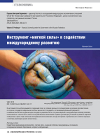“Soft Power„ Instrument in Promoting International Development
DOI: https://doi.org/10.33917/es-6.180.2021.104-117
In the present article the authors substantiate the following thesis: in the context of real polycentrism and increased confrontation between the states with liberal system of values and the states that defend real sovereignty and non-interference in internal affairs of aid-recipient states through a variety of development assistance tools, exceptionally “soft power” can become an effective mechanism of creating conditions for sustainable development of the world community as a whole. In preparing the study the authors applied the methods of historicism and comparative analysis of approaches to the policy of realizing the “soft power” goals.
Источники:
1. Abramova A.V., Gabarta A.A., Degterev D.A., Degtereva E.A., Kapitsa L.M. Inostrannaya pomoshch’ [Foreign Aid]. Pod obshch. red. L.M. Kapitsy; MGIMO (U) MID Rossii, kaf. mirovoi ekonomiki. Moscow, MGIMO-Universitet, 2013, p. 8.
2. Abramova A.V., Zav’yalova E.B., Zaitsev Yu.K., Kapitsa L.M, Kozlova O.A. Sodeistvie mezhdunarodnomu razvitiyu. Kurs lektsii [Promotion of International Development. Lecture Course]. Pod red. V.I. Barteneva i E.N. Glazunovoi. Moscow, 2012, 408 p.
3. Roger C. Riddel. Does Foreign Aid Really Work? Oxford University Press, 2008. P. 77.
4. Sodeistvie mezhdunarodnomu razvitiyu kak instrument vneshnei politiki: zarubezhnyi opyt [Promotion of International Development as a Foreign Policy Instrument: Foreign Experience]. Pod red. V.G. Baranovskogo, Yu.D. Kvashnina, N.V. Toganovoi. Moscow, IMEMO RAN, 2018, p. 19.
5. Ligorio V. Vneshnyaya tenevaya politika Rossii: “myagkaya vlast’” i mezhdunarodnoe obrazovanie [Foreign Shadow Policy of Russia: “Soft Power” and International Education]. European science, 2019, no 5, pp. 83–91.
6. Burlinova N. Russian soft power is just like Western soft power, but with a twist. Russia Direct, 2015, April, 7, available at: https://russia-direct.org/opinion/russian-soft-power-just-western-soft-power-twist.
7. Conley H., Gerber T., Moore L., David M. Russian Soft Power in the 21st Century: An Examination of Russian Compatriot Policy in Estonia. Washington, 2011, D.C, Centre for Strategic and International Studies, available at: http://csis.org/files/publication/110826_Conley_RussianSoftPower_Web.pdf.
8. Giragosian R. Soft Power in Armenia: Neither Soft, nor Powerful. European Council on Foreign Relations, 2015, available at: https://www.europeansources.info/record/soft-power-in-armenia-neither-soft-nor-powerful/
9. Cheskin A. History, Conflicting Collective Memories, and National Identities: How Latvia’s Russian-Speakers Are Learning to Remember. Nationalities Papers, 2012, vol. 40, iss. 4, pp. 561–584.
10. Ćwiek-Karpowicz J. Limits to Russian Soft Power in the Post-Soviet Area. DGAPanalyse, 2012, available at: https://dgap.org/en/article/getFullPDF/21791.
11. Kornilov A., Makarychev A. Russia’s soft power in the South Caucasus: discourses, communication, hegemony. Agadjanian Alexander; Joedicke, Ansgar; van der Zweerde, Evert (Ed.). Religion, Nation and Democracy in the South Caucasus. Routledge Taylor & Francis Ltd, 2015, pp. 238–254.



